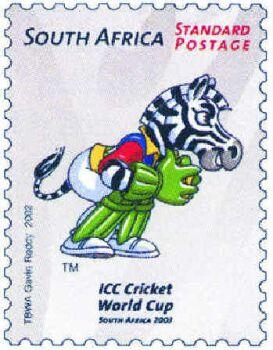ICC Development (International) Ltd. v. Arvee Enterprises and Anr.
ICC Development (International) Ltd. v. Arvee Enterprises and Anr.
2003 (26) PTC 245
Brief Facts:
ICC Development (International) Ltd. (IDL), the Plaintiff, was formed by the members of the International Cricket Council (ICC) to own and control its commercial rights including media rights, sponsorships and other intellectual property rights relating to the ICC events.
IDL was the organizer of the ICC Cricket World Cup held in South Africa, Zimbabwe and Kenya from February 8 till March 23, 2003.
IDL had created a distinct logo and a mascot for the event and filed applications for registration of its trademark in several countries including India, where it had filed applications for registration of the words “ICC Cricket World Cup South Africa 2003” and the logo and the mascot “Dazzler”.
When Defendants, Arvee Enterprises, an authorised dealer for sale and service of electronic goods manufactured by Philips India Ltd. were offering Cricket World Cup tickets as prizes, using the slogans “Philips: Diwali Manao World Cup Jao” and “Buy a Philips Audio Systems win a ticket to the World Cup”, inserting a pictorial representation of a ticket with an imaginary seat and gate number saying “Cricket World Cup 2003”, IDL filed a suit in Delhi High Court for temporary injunction restraining the Defendants from publishing any advertisement associating themselves with the Plaintiff and the “Cricket World Cup” in any manner whatsoever.
Arguments on behalf of the Plaintiff:
• The Defendants were misrepresenting their association with the Plaintiff and the World Cup, by advertising in media, including newspapers, television, the Internet and magazines.
• Defendants’ intention is to unlawfully derive commercial benefit by associating itself with the Plaintiff and the World Cup, thereby seeking to piggy back on the reputation of the Plaintiff;
• Defendants’ actions were malafide and dishonest guided by the sole intent of damaging the reputation of the Plaintiff and the sponsors of the event, who are engaged in the same line of business as the Defendants are, and who have been duly authorised by the Plaintiff to associate themselves with the World Cup and to offer such schemes;
• The ticket conditions of the World Cup event prohibit such distribution of tickets, unless authorised by the Plaintiff;
• The Defendants have resorted to ‘ambush marketing’ to take advantage of the World Cup event without investing anything towards its success; and
• Defendants are depriving the sponsors of the World Cup event from enjoying the exclusivity of rights granted to them and preventing the Plaintiff from performing its contractual obligations.
Arguments on behalf of the Defendants:
• The words “World Cup” have been used in their advertisements in a generic manner and they have not used either the logo or the entire phrase “ICC Cricket World Cup South Africa 2003”;
• The slogan merely shows that the purchaser of their goods may win a ticket or a travel package to see the World Cup event and there is nothing in the advertisement to create any confusion in public mind that they are sponsors or licensees of the event;
• They have not sought to derive any association, relationship or affiliation with the Plaintiff
• The “World Cup” is a generic word and have been used to refer to several other international sporting events. It is also not protected by any international treaty or domestic law unlike the word “Olympic” and its logo, which is protected under the Emblems and Names (Prevention of Improper Use) Act 1950;
• They had booked tickets and travel packages through the sole authorised tour operator and agent of the Plaintiff and the ticket conditions were never brought to their notice and the same are against public policy.
Court’s Observations:
On Breach of Ticket Conditions
The contention of IDI that Philips had breached the terms of sale of the tickets, which specifically prohibited use of the tickets for promotion or as prizes for competitions, was rejected by the court because Philips had purchased the travel packages from the Indian sub-agent of the official tour operator of IDI, and these terms were never brought to the notice of Philips.
On Passing Off
The court held that Philips’ slogans merely showed that the purchasers of its goods might win a ticket and travel package to see the World Cup and nothing more. Admittedly, Philips had not used IDI’s logo or mascot. The campaign may have drawn the attention of the public to the event, but there was no likelihood of confusion in the mind of the purchasing public that Philips was a sponsor or licensee. Therefore, the basic criteria for a passing off action or for unfair trading were not met.
On Ambush Marketing
The court observed that the phrase “ambush marketing” is used by marketing executives only and is different from passing off. In a passing off action, there is an element of overt or covert deceit, whereas ambush marketing is opportunistic commercial exploitation of the event. The marketer does not seek to suggest any connection with an event, but gives his own brand or other insignia a larger exposure to the people attached to the event, without any authorization of the event organizer. In such cases there is no deception, therefore the Defendants’ conduct cannot be categorized as wrongful or against public interest. The court held that commercial advertising is commercial free speech and protected under Article 19 (1) (a) of the Indian Constitution. An advertisement campaign without using the logo or mascot of the Plaintiff cannot be held to be unlawful.
Thus, it is for the legislature to decide how far to curtail the legitimate fair competition and freedom of speech. In India no statutory or common law prohibits such an activity and the World Cup is not protected by any international treaty or domestic law, unlike the Olympic Games and its trademarks, which are protected under the Indian Emblems and Names (Prevention of Improper Use) Act, 1950.
On Right of Publicity
The court held that the right of publicity has evolved from the right of privacy and applies only to an individual or any indicia of an individual’s personality. Therefore the Right of Publicity does not extend to non-living entities. An individual may acquire the Right of Publicity by virtue of association with an event; however, that right does not apply to the event in question, nor the organizer behind the event. Any effort to take away the right of publicity from the individual to the organizer (non-human entity) of the event would violate Articles 19 and 21 of the Constitution of India.
On the expression ‘World Cup’ being Descriptive and Generic
The court ruled that “World Cup” is a dictionary term for an event or tournament in which several countries participate. Thus, the terms, “World Cup” and “Cricket World Cup” are generic and non-exclusive.
In view of the aforesaid, the Hon’ble Court declined to grant an interim injunction in favour of the Plaintiff.
Author: Paazal Arora, ILS Law College, Pune



One Comment